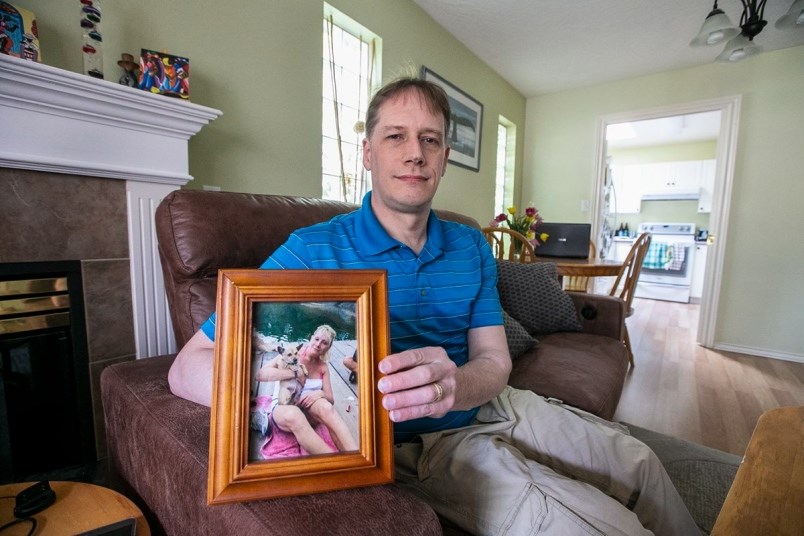Kirsten Apeldoorn was found dead of a drug overdose in her Saanich home last year, the third suspected overdose death in the region in as many days. It was Jan. 30 — her 43rd birthday.
Her brother Rod Apeldoorn, a computer programmer, recalls police saying there were several overdose calls in the area on that day.
The opioid overdose death toll has plateaued at three or four a week in B.C. since it was declared a public-health crisis in 2016. In 2018, 1,510 people died of a drug overdose in B.C., compared with 991 in 2016 and 530 in 2015, according to the B.C. Coroners Service.
But the numbers are much more than statistics, Apeldoorn said — each represents a person with a history and a family that loves them. Like many family members of overdose victims, he is advocating for legislative and health policy changes to mitigate overdose-related deaths.
This past week, provincial health officer Dr. Bonnie Henry recommended decriminalization for possession of personal amounts of drugs, suggesting such changes would prevent people who use illicit drugs from facing jail time or ending up with a criminal record for simple possession, and allow them to be linked to health and social services.
Henry noted the “war on drugs” is widely recognized as a failure for stigmatizing people, preventing them from holding jobs, and stopping them from getting medical and mental-health care.
Solicitor General Mike Farnworth poured cold water on the public health officer’s recommendation, saying possessing such substances is illegal under federal law and no provincial action can change that. A number of police forces are already working to reduce the fear of reporting overdoses and to connect people to health services, he said.
Apeldoorn, who has visited Portugal, where possession of personal amounts of substances has been decriminalized, said Canada has a lot to learn from that country. “Because it’s decriminalized, they can actually treat addictions like any other health problem,” he said.
Solving the opioid crisis is complex and requires a range of solutions, including decriminalization of simple possession, he said. It also requires better detox, recovery and treatment spaces; destigmatizing addiction and mental-health challenges; and better health and mental-health outreach.
“All we can do is keep on trying,” Apeldoorn said.
Kirsten was likely bipolar much of her life, but it wasn’t diagnosed until much later, said her brother, who suspects she started using drugs as a way of dealing with her anxiety and anger issues.
Despite her own depression, his sister was a natural at making people laugh, he said.
“She was always putting people in a good mood,” Apeldoorn said.
“She could brighten almost anyone’s day. She was always trying to laugh and joke and make people feel good.”
For a number of years, she worked at a McDonald’s restaurant, where she had a way of recognizing late-night patrons who were in a bad way, and talking through their problems, Apeldoorn said. “She could calm down almost anyone.”
Kirsten lived on and off with her mother and took advantage of an open-door policy to visit her siblings.
“We did everything we could when my mother was around,” he said. But when their mother died in 2017, Kirsten went downhill. (Their father died when they were children.)
She hung around the Tillicum Road bridge with people who were “up to no good,” Apeldoorn said.
One thing that can sometimes help, he said, is giving people like his sister — people with addictions and mental-health challenges — a purpose.
“With her mental illness, she had a hard time maintaining jobs, but she always wanted to help, she would always try,” he said. “I’d love if we could find more ways to give people a purpose, people who want to participate in society.”
Doctors of B.C. president Dr. Eric Cadesky said he supports the provincial health officer’s recommendation to decriminalize possession of personal amounts of drugs. “Our focus is on our patients and we support any proposal that reduces the stigma that’s attached to substance use.”
But he said more family doctors are also needed to combat the opioid crisis.
Cadesky points to a provincial plan to build more primary-care networks and bolster team-based care — where doctors work directly with addiction counsellors, social workers, nurses, psychologists and others — as a way to give patients the scope of care they need.
Family doctors on the front lines of the opioid crisis are not only dealing with substance use, but the range of issues that come with addiction, including trauma, especially childhood trauma, often seen as a contributor to substance use, he said.
-Cindy E. Harnett, Times Colonist



